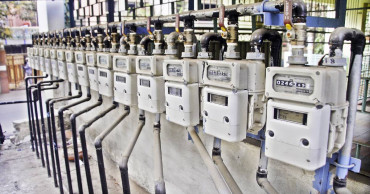Japan International Cooperation Agency
Second stakeholder meeting on energy master plan Sunday, 'final report by Dec'
The second stakeholder meeting on the proposed Integrated Energy and Power Master Plan (IEPMP) will be held in the city on Sunday.
Japan International Cooperation Agency (JICA) and the Ministry of Power, Energy and Mineral Resources (MPEMR) will jointly hold the meeting.
Tokyo-based consulting firm Institute of Energy Economics-Japan (IEEJ) has been engaged to prepare the integrated master plan following an agreement between the Bangladesh government and Japan International Cooperation Agency (JICA), signed on March 15 in 2021.
It held the first stakeholder meeting in November 2021 to kickoff its job.
Also read: Relations with Bangladesh now deeper, more extensive: JICA
According to official sources, the Japanese firm held a series of meetings in the past one-and-a-half years with stakeholders, including energy professionals, academics and also different private and public entities to get their views on the future master plan.
About the proposed plan, Power Cell director Mohammad Hossain said that the Japanese firm’s job is now at the concluding stage as it has planned to submit its first final report by December.
“This is for the first time that the government has moved to formulate an integrated master plan comprising both power and energy issues," he told UNB.
Previously, separate master plans were framed for the power sector and energy sector and there was little coordination between the two sectors.
Official sources said the government has moved to formulate the integrated master plan with a focus on the "3E+S" concept, after responding to the suggestions of energy experts.
Also read: JICA wants to install Incinerator plants to dispose medical waste
According to sources, '3E+S' concept will be pursued in preparing the new plan for ensuring 'Energy Security', 'Economic Efficiency', and 'Environment' while focusing on 'Safety'.
As per the contract, the Japanese firm is supposed to formulate the plan within 30 months of the signing of the agreement.
JICA, which has been funding the entire project, said that in view of the need for a long-term low-carbon energy policy, it will support the formulation of the master plan.
The Japanese donor agency had earlier provided the financial and technical support for formulating all the previous power system master plans (PSMPs) until 2016.
Official sources said the JICA consultant will study the country's 8th Five-year Development Plan, gas sector master plan 2017, and revise the power system master plant 2016 and other relevant policies.
It will prepare the prospects for economic development and energy demand forecast by 2050 with a focus on energy efficiency and conservation.
In the existing power system master plan (PSMP) 2016, about 60,000 MW of power generation was targeted by 2041.
The BPDB official data shows the country’s total generation capacity is 25,235 MW, of which grid-connected generation is 22,348 MW up to April this year while the remaining 2,887 MW is captive generation, mainly produced by industry owners, exclusively for running their own industries.
The country’s highest generation was recorded at 14,782 MW on April 16, meaning that the surplus capacity is 10,453 MW (about 41 per cent).
Currently, 50 per cent of power is being generated from gas while less than 10 per cent is from coal and about 30 per cent is generated from imported liquid fuel.
3 years ago
Relations with Bangladesh now deeper, more extensive: JICA
Senior vice president of Japan International Cooperation Agency (JICA) Keiichiro Nakazawa has said Bangladesh is now one of the largest partners among the more than 100 partner countries.
“Over the past 50 years, the relationship between JICA and Bangladesh has become deeper and more extensive,” he said while celebrating the 50th anniversary of Bangladesh-JICA cooperation organized by the Economic Relations Division (ERD) and JICA in a city hotel on Thursday.
In the early days of cooperation, Nakazawa said, their focus was mainly on agriculture development. “Today, we are working in almost all sectors.”
Also read: JICA wants to install Incinerator plants to dispose medical waste
3 years ago
JICA wants to install Incinerator plants to dispose medical waste
Development assistance organization Japan International Cooperation Agency (JICA) is interested in establishing incinerator plants to dispose of medical wastes produced in hospitals under the city corporation areas.
It is also interested in installing a new water treatment plant following the public-private partnership (PPP) funding model at Chattogram Water Supply and Sewerage Authority (WASA), said Japanese Ambassador to Bangladesh Ito Naoki.
The ambassador expressed the interest to Local Government, Rural Development and Co-operatives Minister Md Tajul Islam during his visit at the ministry on Sunday.
Also read: Stronger JICA cooperation sought for Bangladesh's development
The minister welcomed the proposal to establish a water treatment plant and incineration plant with Japan’s aid. He said “The ministry will inform its decision in this regard after the proposal is formally made through a letter.”
Tajul said,” Various initiatives have been taken to bring medical waste under proper management. The government has directed all the public-private medical and diagnostic centres to disinfect their medical waste and give it to waste collectors in prescribed bags instead of throwing it just anywhere.”
He added that the public needs to be aware of medical waste as well as industrial waste and electronic waste. “If these wastes can be disposed of in an echo-friendly manner, it will be possible to prevent pollution,” he said.
Also read: JICA to hold stakeholders meeting for energy-power master plan
Japan has provided a lot of assistance for the development of Bangladesh and that cooperation will continue in the future as well, said Ambassador Ito.
“Bangladesh has a long history of friendly relations with Japan,” he said and expressed hope that this relationship would be further strengthened in the future.
3 years ago
JICA to hold stakeholders meeting for energy-power master plan
The first ever stakeholders’ meeting on formulation of an integrated energy and power sector master plan is set to take place in a city hotel on Tuesday.
According to official sources, Japan International Cooperation Agency (JICA) is holding the meeting to understand the current state of the sector and take opinion of different entities on framing the future plan.
They said JICA, which is funding the entire project through its grant under a deal with the ministry of power, energy and mineral resources (MPEMR) will complete the formulation of the integrated energy and power master plan by December 2022 under a 30-month completion contract.
READ: Desco’s underground cabling plan misses JICA deadline for its own fault
Tokyo-based consulting firm Institute of Energy Economics, Japan (IEEJ), which has been appointed consultant for the project, has already started work following an agreement the Bangladesh government signed with JICA on March 15 this year in this regard.
The JICA official website said the integrated energy and power master plan’s major focus will be on the "3E+S" concept.
“We’ll pursue the "3E+S" concept of ensuring "Energy Security," "Economic Efficiency," and "Environment" while focusing on "Safety," said the JICA, adding, “In view of the need for a long-term low-carbon energy policy, we will support the formulation of the integrated energy and power master plan.”
Prime Minister’s Energy Advisor Dr. Tawfiq-e-Elahi Chowdhury will inaugurate the first session of the meeting while State Minister for Power, Energy and Mineral Resources Nasrul Hamid will address at the concluding session of the function.
Earlier, JICA had provided financial and technical support for formulating all the previous power system master plans (PSMPs) until 2016.
According to official sources at the MPEMR, for decades, Bangladesh had prepared two separate master plans—one for the energy sector and another for power sector—where there had been many missing links and lack of coordination resulting in imbalance between the energy and power sector’s growth.
READ: JICA to implement Tk 882 cr food value chain dev project in Bangladesh
"But for the first time, we’re going to formulate an integrated master plan putting equal emphasis on development of both the sectors in order to support the current robust economic growth,” said Mohammad Hossain, Director General of Power Cell.
In the existing power system master plan (PSMP) 2016, about 60,000 MW of power generation was targeted by 2041 in which primary fuel mix set at 70 per cent coming from coal and gas while the remaining 30 per cent will be covered by liquid fuel, renewable, nuclear and other sources.
Currently, the country's power generation capacity is over 21,000 MW, of which about 50 per cent of power is being generated from gas while less than 10 per cent is from coal. About 30 per cent of power is generated from imported liquid fuel.
4 years ago
With eye on 3 SEZs, Japan wants to boost its investment in Bangladesh
Japan eyes three special economic zones (SEZs), including the one at Araihajar, Narayanjanj, to give a big boost to Japanese investment in Bangladesh but things depend on the success of the first one, says Japanese Ambassador to Bangladesh Naoki Ito.
“This (Araihajar EZ) should provide the best possible environment and the best possible incentives for the investors,” he said, adding that a special economic zone is a very important key to invite an increasing number of Japanese companies to invest in Bangladesh.
Ambassador Ito said he has been advocating that Araihajar should be the best possible economic zone in Asia, beating its rivals in countries like Vietnam, Myanmar and the Philippines.
The envoy said they will look into opportunities at Mirsarai under Bangabandhu Sheikh Mujib Shilpa Nagar, being developed on a contiguous land of 30,000 acres, and a possible economic zone in Maheshkhali-Matarbari area if Araihajar becomes successful.
He shared the plans on the three potential economic zones for the Japanese investors in Bangladesh while responding to questions at a virtual dialogue titled “Bangladesh-Japan Relations: Prognosis for the Future” where he delivered the keynote speech.
Cosmos Foundation, the philanthropic arm of the Cosmos Group, hosted the dialogue as part of its ongoing Ambassador’s Lecture Series.
The opening remarks were delivered by the Cosmos Foundation Chairman Enayetullah Khan. The session was chaired by Dr Iftekhar Ahmed Chowdhury, renowned scholar-diplomat and former Advisor on Foreign Affairs of Bangladesh Caretaker Government.
Md Abul Kalam Azad, Special Envoy, Climate Vulnerable Forum; Hayakawa Yuho, Chief Representative, JICA Bangladesh Office; Dr Salehuddin Ahmed, former Governor, Bangladesh Bank; Prof Masaaki Ohashi, Professor, University of the Sacred Heart, Tokyo; Manzurul Huq, Columnist, writer and academic; Prof Takahara Akio, Dean, Graduate School of Public Policy, the University of Tokyo and Ambassador (Retd) Tariq A Karim, Honorary Advisor Emeritus, Cosmos Foundation comprised the panel of discussants.
Read: Ambassador Ito sees 5 challenges ahead to elevate Dhaka-Tokyo ties
Ambassador Ito said the Economic Zone at Araihajar will be ready for its operation by the end of the next year.
4 years ago
Desco’s underground cabling plan misses JICA deadline for its own fault
An ambitious plan by Dhaka Electric Supply Company Ltd to send the overhead electric cables underground in the city’s posh areas has to wait.
How long? Not even the utility company has an answer.
And it has itself to blame for the uncertainty over the Tk. 240 crore-project.
The company has failed to meet its March 30 deadline to place its proposal to the funding agency Japan International Cooperation Agency (JICA).
Also read: Dhaka’s overhead power cables finally to go underground
The company had planned to take its all overhead electric cables underground in the Gulshan, Banani, Baridhara and Badda areas following directives from the Power Division of the Ministry of Power, Energy and Mineral Resources.
4 years ago
BARVIDA asks for tax- free microbus imports and 45% depreciation facility
Bangladesh Reconditioned Vehicles Importers and Dealers Association (BARVIDA) called on the government to withdraw tax on microbus as it is widely used for public transportation and has a significant impact on urban and rural life.
Secretary General of the organization Mohammad Shahidul Islam made this call at the post-budget press conference held in BARVIDA office Wednesday.
Mohammad Shahidul Islam said they wanted the government to provide the 45% depreciation benefit on reconditioned cars and a year-round depreciation benefit but it was not included in the budget.
He urged the government to consider their proposal and include the depreciation benefit to the budget.
In this conference BARVIDA sincerely thanked the Prime Minister and Finance Minister for preparing a new budget amid pandemic that includes reduced tariffs on imports of microbuses and hybrid cars and jeeps.
Read Top Insurance Companies in Bangladesh in 2021
They also praised the government for recognizing microbuses as public transport and discouraging unsafe transport like Nasimon, Laguna, etc.
Quoting Japan International Cooperation Agency (JICA), BARVIDA leaders mentioned that the establishment of a new car industry in the country would be reasonable only if the domestic market for the car is 1 lac units.
They pointed out that in some cases, the price of a reconditioned car gets higher than that of a new car due to extreme inequality in the tariff. As a result, buyers are declining, importers are declining and traders in the sector are facing a severe financial crisis.
Also read: The World's 10 Self-made Youngest Billionaires in 2021
BARVIDA also called on the government to ensure that no attempt is made to establish a "screwdriving industry" by importing CKDs (Complete Knock Down) in the name of establishing a new industry.
They urged the government to do its utmost ensuring that the country's long-established reconditioned car import sector is not harmed in any way at the free market economy.
Abdul Haq, President of the Association along with the executive members and general members of the organization were present at the conference.
4 years ago
Japanese development model best for Bangladesh to emulate: Speakers
Speakers at a JICA seminar opined that the Japanese model of development might be the best pathway for Bangladesh in achieving economic goals and turning itself into a developed country.
4 years ago
JICA to implement Tk 882 cr food value chain dev project in Bangladesh
Japan International Cooperation Agency (JICA) will implement a food value chain development project at a cost of about Tk 882 crore to expand agricultural processing and agribusiness in Bangladesh.
5 years ago
Dhaka’s five more areas likely to get prepaid gas metres from July
The household consumers of five more areas in the capital are going to get prepaid gas metres within this year as Japan International Cooperation Agency (JICA) has approved an additional funding for an ongoing project of Titas Gas.
6 years ago
.jpg)
.jpg)





.jpg)





